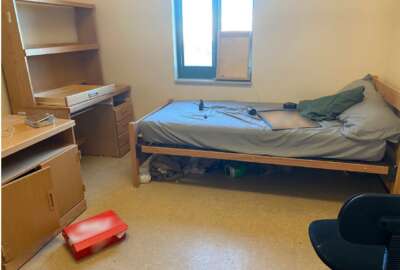Defense officials ask Congress for support with military pay, housing, but it will likely be years in the making
Despite high agreement that improvements are necessary, it will likely still be years before Congress and the Defense Department can fully address major...
The military’s senior enlisted leaders have just made what may be their final pitch to Congress ahead of a highly anticipated plan aiming to improve the quality of life for military personnel.
Pay, child care, housing, health care and spousal employment all remain major issues impacting the military’s recruitment and retention goals, the Defense Department officials told House Armed Services Committee (HASC) members during a panel hearing Wednesday.
Despite high agreement that changes are necessary, it will likely still be years before Congress and DoD can fully address the military’s quality-of-life challenges through the appropriations process.
HASC first stood up a temporary panel in June 2023 designed to focus exclusively on quality-of-life issues for military members. The panel, composed of 13 Congress members, has held hearings over the last several months to consider various personnel challenges, as well as possible solutions. House officials have said an upcoming report based on the discussions during those hearings will inform changes to be included in the fiscal 2025 National Defense Authorization Act (NDAA).
Increasing military pay, improving housing conditions and adding more child care options are all possibilities still on the table for the 2025 NDAA.
“Providing acceptable quality of life is the very least we can do,” Rep. Don Bacon (R-Neb.), the panel’s chairman, said during a hearing Wednesday. “The work of this panel has revealed an alarming erosion of military quality of life that, if not addressed quickly, will place the very existence of our all-volunteer force at risk.”
Of the five quality-of-life issues the panel has been considering, Bacon asked each DoD official to say what they felt were the top two for their branch. The answers were varied, ultimately appearing to show that each of the five issues is equally vital.
“That’s an incredibly complicated and complex question that has a lot of interconnectivity between each one of those,” Sergeant Major of the Army Michael Weimer said.
Some problems, however, require more immediate action. The DoD officials took the opportunity to bring attention to issues of compensation for military personnel — especially for junior members. Chief Master Sergeant of the Air Force Joanne Bass reminded the panel that Congress has not given military members a targeted pay raise since 2007.
“A couple of these problems are so big that if we don’t start taking immediate action on them now, we’re going to miss the curve in the future,” Master Chief Petty Officer of the Navy James Honea added. “Military pay and compensation reform is going to be one of those big problems that we need to start taking a bite at today.”
In another major challenge, poor living conditions for military members is severely undermining DoD’s ability to recruit and retain members. The Government Accountability Office released a scathing report in September 2023 providing details into the subpar housing. Some military barracks do not meet even the most basic living conditions, as members have to deal with sewage overflow, mold and mildew, inoperable fire systems and broken air conditioning units — just to name a few issues.
The September report made 31 recommendations, and although DoD concurred with most of them, GAO officials have told Congress that turning some of the recommendations into law may be the best route — DoD has at many times in the past agreed to implement fixes, but the problems continue to worsen.
Sergeant Major of the Marine Corps Carlos Ruiz agreed that creating a better strategy and maintaining sustained funding is necessary, but he added that there has been at least some progress to improve military housing conditions, in what he called “quick wins.”
“I’ve seen refurbished barracks — we have quite a few of them,” Ruiz said. “We’ve done 30 of them in two years, and we plan on doing more.”
The DoD officials at Wednesday’s panel hearing said consistent appropriations will be crucial to improving not only military housing, but all the quality-of-life issues under the House’s close watch.
“There was an express concern about the planning out to do that modernization,” Chief Master Sergeant of the Air Force John Bentivegna said. “A stable budget is critically important to plan that out. That’s where we need help.”
Child care, another top concern for both DoD leaders and members of Congress, will also require major improvements. Defense officials said improving staffing numbers at child care centers has been promising, but added there must be continued and broader improvements going forward.
For the Marine Corps, staff turnover at child care facilities has dropped from 48%, now down to below 20%. Similarly, staffing for the Air Force’s centers has increased from 65% to 81% in the last year. As a result, the Air Force’s waitlist for child care services has also shrunk by 31%, Bass said.
Ultimately, it will require a holistic approach with adequate funding and attention to make improvements in the long term, the DoD officials said. But the current continuing resolution is hampering DoD’s ability to adequately address the major quality-of-life issues.
“We’re going to tackle this the best we can,” Bacon said. “We may not be able to pay for everything in one budget cycle, but we’re going to work hard with our appropriators and come up with a strategy to get this right.”
Copyright © 2025 Federal News Network. All rights reserved. This website is not intended for users located within the European Economic Area.
Drew Friedman is a workforce, pay and benefits reporter for Federal News Network.
Follow @dfriedmanWFED






